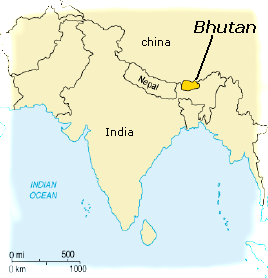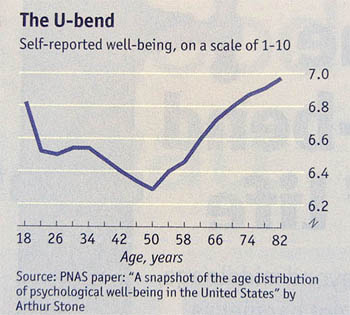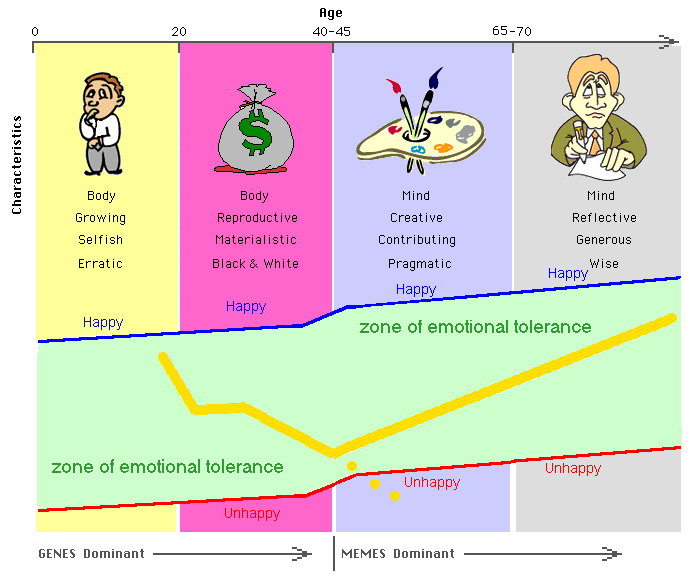11. The U-bend of happiness in life
Previous - Next - Contents
A few months after completing my previous article in this
series I read a very relevant article in the weekly International Magazine The
Economist entitled "The U-bend of Life" (December 18, 2010 - page 33).
Here follow (in my own words) some of the points
made and where appropriate my comments on it.
 In recent years an increasing number of Governments around the world is starting
to
realise that measuring and expressing the health of a nation solely through its
economic GDP index
(Gross Domestic Product) is not enough. It is felt that some measure of the
general
well-being of the nation's citizens should also be included.
In recent years an increasing number of Governments around the world is starting
to
realise that measuring and expressing the health of a nation solely through its
economic GDP index
(Gross Domestic Product) is not enough. It is felt that some measure of the
general
well-being of the nation's citizens should also be included.
In Bhutan (the last Himalayan Buddhist Kingdom) this is actually
expressed by its Gross National Happiness (GNH) which must be included (like an
Environmental Impact study) in every new policy proposal.
Other countries too (such as France under president Nicolas Sarkosy, and England at
the direction of David Cameron) are at present gathering data to get a
grip on their people's general well-being.
According to The
Economist's article a considerable amount of research has already been done and
compiled at present, with some very interesting results.
- For example it has been revealed that females (although
easier depressed) tend to be happier than men.
I believe
that this is quite realistic. Females (I have always felt) have an strong
earth related sense of purpose due to their child bearing capacity. Unlike
men they have less need to prove themselves, with less anxiety as a
consequence.
- Also there is a tendency of
extroverts to be happier that introverts.
Extroverts of course thrive on their contacts with
friends. For introverts this is a strong happiness factor they tend to ignore
or struggle with throughout their lives.
- And childless couples tend to be happier
than couples with children.
All their attention and love is solely focused on one another and not partly
diverted to children. A child can (and usually does) add considerably to a parent's
happiness, but it can also cause worries, anxieties, and during its upbringing
financial stress.
 The most startling findings, supported by research on 72 countries covering a range
of human races, is the so-called U-bend of Life : a U shaped graph depicting
the self reported sense of well-being which is identical for all countries
and independent of cultural, geographical and other differences between the various
nations.
The most startling findings, supported by research on 72 countries covering a range
of human races, is the so-called U-bend of Life : a U shaped graph depicting
the self reported sense of well-being which is identical for all countries
and independent of cultural, geographical and other differences between the various
nations.
The position of the lowest (least happy) point of the graph does vary between 35
years (for the Swiss) and 62 years (for Mongolians), but for the majority of the 72
countries falls between 40 and 50 years of age. The Global average being
46.
The results have been tested against
various outside controls but has remained valid after every single test.
I have fitted the U-bend graph within a widened version of Bjorn Grinde's
Darwinian zone of emotional tolerance on my Diagram showing the four
phases of life. This shows that our happiness tends to decrease strongly while
living through the two first materialistic, gene controlled phases of our life, but
then starts to
improve again when our genetic function (producing and rearing offsprings) has been
fulfilled and we enter our
pragmatic and creative phase.

The Economist aptly describes the Nadir point (lowest point) on the U-bend as the
"death of ambition, birth of acceptance". The point in life where we have
come to accept our strength, weaknesses and realistic potential.
We have become
less future goal driven and instead focus more on the here and now of
our life in this world.
 Gone are the days
of overreaching idealistic notions and unattainable aspirations.
Gone are the days
of overreaching idealistic notions and unattainable aspirations.
Instead
we have become
more realistic and (having shed all the anxieties and frustrations
concerning our jobs, social status, children etc.) are now in a much better mind
frame to follow a path of personal happiness.
The early 20th Century Russian composer Igor Stravinsky once said :
"To continue in one direction is to go backwards."
The U-bend of Life shows that our mental outlook on life changes direction dramatically halfway through its course. Provided we have the courage to follow through with that in a real sense happiness will be the reward.
I include here a Diagram for you dear
reader, to print out and plot your own graph of well-being as you have
experienced it up to this point in your life.
Next page
Copyright © 2011 Michael Furstner
|

 The most startling findings, supported by research on 72 countries covering a range
of human races, is the so-called U-bend of Life : a U shaped graph depicting
the self reported sense of well-being which is identical for all countries
and independent of cultural, geographical and other differences between the various
nations.
The most startling findings, supported by research on 72 countries covering a range
of human races, is the so-called U-bend of Life : a U shaped graph depicting
the self reported sense of well-being which is identical for all countries
and independent of cultural, geographical and other differences between the various
nations.
 Gone are the days
of overreaching idealistic notions and unattainable aspirations.
Gone are the days
of overreaching idealistic notions and unattainable aspirations.